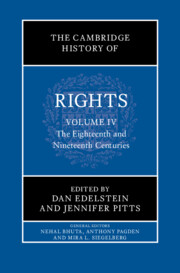Book contents
- the cambridge history of rights
- The Cambridge History of Rights
- The Cambridge History of Rights
- Copyright page
- Contents
- Figures
- Contributors to Volume IV
- General Introduction
- A Note on Translations
- Introduction to Volume IV
- Part I A Revolution in Rights?
- Part II Postrevolutionary Rights
- 12 On the Nadir of Natural Rights Theory in Nineteenth-Century Britain
- 13 The 1789 Declaration of the Rights of Man and of the Citizen
- 14 Rights in the Thought of Kant, Fichte, and Hegel
- 15 Rights and Socialism 1750–1880
- 16 Economic Liberalism and Rights in the Nineteenth Century
- 17 Human Rights during the 1848 Revolutions
- Part III Rights and Empires
- Index
- References
15 - Rights and Socialism 1750–1880
from Part II - Postrevolutionary Rights
Published online by Cambridge University Press: 22 January 2025
- the cambridge history of rights
- The Cambridge History of Rights
- The Cambridge History of Rights
- Copyright page
- Contents
- Figures
- Contributors to Volume IV
- General Introduction
- A Note on Translations
- Introduction to Volume IV
- Part I A Revolution in Rights?
- Part II Postrevolutionary Rights
- 12 On the Nadir of Natural Rights Theory in Nineteenth-Century Britain
- 13 The 1789 Declaration of the Rights of Man and of the Citizen
- 14 Rights in the Thought of Kant, Fichte, and Hegel
- 15 Rights and Socialism 1750–1880
- 16 Economic Liberalism and Rights in the Nineteenth Century
- 17 Human Rights during the 1848 Revolutions
- Part III Rights and Empires
- Index
- References
Summary
This chapter places Marx’s well-known critique of individual rights in On the Jewish Question (1843) in the context of a more widespread indifference to rights languages in the early socialist movements of Britain, France, and Prussia. For all their differences, early socialists agreed that genuine human flourishing would require transcending what Marx was to call the “narrow horizon of bourgeois right.” The chapter charts the swinging pendulum of rights discourse in the early nineteenth century. While the century began in both Britain and France in reaction against revolutionary rights language, the years from 1815 through the early 1830s saw a revival of rights claims among British radicals, culminating in the Chartists’ embrace of natural rights, and in France, where radical republicans demanded manhood suffrage in the name of the Rights of Man. Proudhon’s What Is Property?, written in reaction to the 1830 Revolution, signaled and also helped to shape a decisive turn against rights among incipient socialist movements: in its explicit critique of individual property rights as failing to recognize the socialized character of production, but also in its more general lack of interest in rights discourse. French socialists, in the splintering Saint-Simonian movement, embraced democracy rather than rights as the language of emancipation, while in Germany the socialists emerging out of the fragmenting Young Hegelian movement likewise saw rights, especially property rights, as impediments to true, human, emancipation. Yet because rights were not central to their adversaries’ program, socialists including Marx largely ignored them. Finally, after 1860, rights claims saw something of a resurgence among socialists, with social democratic textbooks asserting rights demands as appropriate in the early stages of socialism.
- Type
- Chapter
- Information
- The Cambridge History of Rights , pp. 361 - 383Publisher: Cambridge University PressPrint publication year: 2024

